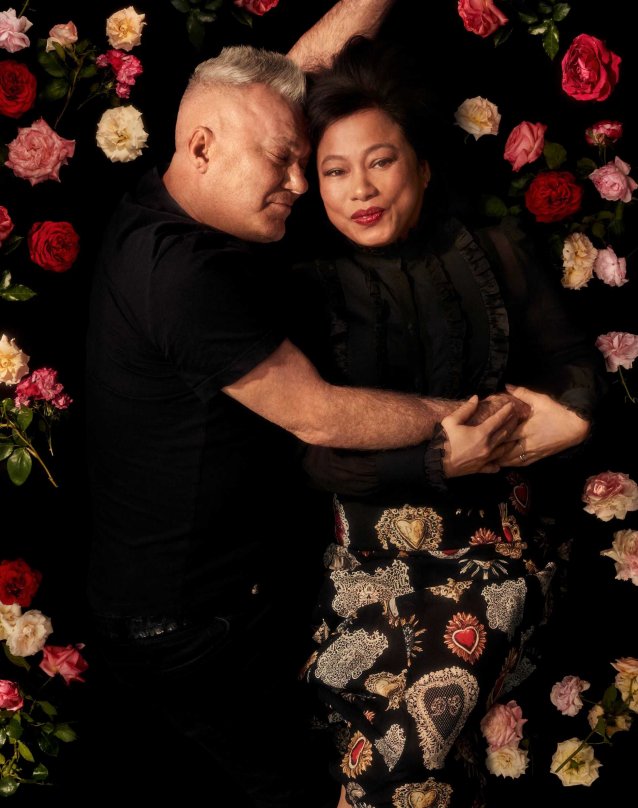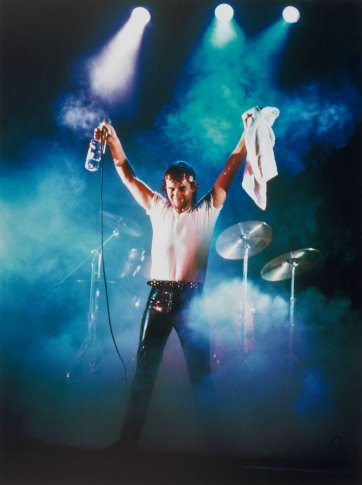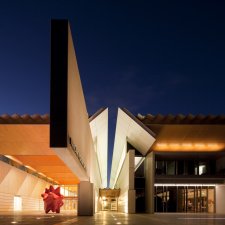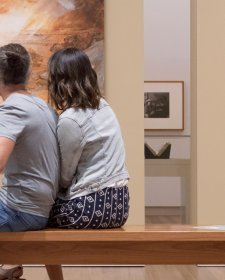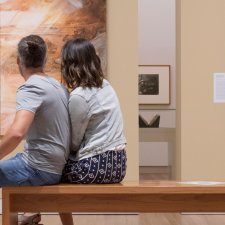- I wanted to do their love story justice too, you know. How, how do you capture that and sum it up in a picture? But I wanted to, to pic Jimmy in a way that, you know we're not often used to seeing him. I wouldn't say submissive is the word, but he's, looks, at peace and very calm and,
- Yeah.
- and gentle, you know, his eyes are closed. He's being embraced. Well, he's embracing Jane. They're almost like a, a ying and yang. And I feel like that's what my auntie is to, to my uncle's.
- Yeah.
- You know, she balances his energy out.
- Yeah.
- Because we're used to seeing pictures of him and he is a tough guy and he does scream on stage.
- But that's not, who I know.
- That's what I do. That's what I do there.
- But, you know, I'm not, not like that at home. I'm, you know,
- No.
- I'm different at home. Because we're close, we, you know, but we'd spoke about the actual doing the photograph and what we wanted to achieve with it as well, didn't we?
- [Jesse] Yeah.
- It was sort of, you know, Jane had a lot of, a lot of input.
- Oh, well, the idea was Elizabeth's poem. We had a beautiful French friend who wrote a, a love story. Yeah.
- Of, of us, how she saw our love and she put together this little book of Marc Chagall, Marc Chagall and Bella. It really sort of spoke something about our relationship.
- [Jesse] Yeah.
- But then, you came up with the idea of Uncle Jimmy's Roses.
- We have a beautiful garden at home. And the rose patch particularly, that's the only one I can look, sort of look after, because I'm not not that great a gardener. But friends would give us, give me roses, instead of,
- Yeah, for your 60.
- we don't want gifts.
- What happened was, everybody brought rose.
- Yeah. For me, for as, as a-
- So we created this,
- Rose garden,
- amazing rose garden.
- They grow so well. I, I don't do that much, but I would go down and and pick roses for, for Jane all through lockdown. And every day I'd, I'd pick a new bunch and say, look at this. Isn't this great?
- You know, and this smell beautiful, like these, like these are from the garden. And the whole metaphor of the roses and you know, things, you know, love's not always, you know, easy,
- a bed of roses.
- It's not always a bed of roses. It's not always easy,
- Sort of thorns.
- And it takes work.
- Yeah.
- And there's thorns. It's not always gonna, it's not always gonna be great. But the, but it's about living through that and, and sharing those experiences.
- [Jane] There's many layers too.
- [Jesse] Mm.
- [Jimmy] Yeah. And all the symbols in that. Just in the roses, coming from our garden.
- Yeah.
- And you know, Jesse being involved, like you said, just the family capturing, and he knows us, you know and he's known us all his life and through, he knows our warts and all, you know and we're individuals there too. And that's just, all these messages are important.
- Mm hmm.
- You know, the bed of roses, the, the you've got to fight those thorns. All of that.
- Mm.
- [Jesse] For me, it started quite young, photography. I was like eight or nine years old. A family friend of ours, Wendy McDougall, she put a camera in my hand and, and I just thought it was magic. You know, as a kid, eight or nine years old, we'd go out and I'd take pictures and then she'd develop them in the dark room. And I just thought it was the coolest thing ever, you know to be able to freeze moments in time. And, and, and so she had a huge influence on me for sure. You know, but, also just my father and, and my uncle. Their work ethic, you know, and just their prolific output you know, that has been a huge impact on me. And, and seeing, seeing their dedication to their craft and just how relentless they are with that, I think.
- I think music and, and photography and music and art, and and the, the all sort of expressions of the soul. And, and, and it even down to the fact of, you know like working together and make album covers and think some the best album covers are made working together within the family. Writing songs with, with, with Jesse's dad.
- It's a blessing, isn't it?
- It's really,
- That you have that. it's really incredible.
- Mm.
- And when you get to work
- Be able to work.
- with people that
- Yeah.
- you're that close to, they, you know, there's there's just this understanding and, and, and, and ease. And you know, that you and I think they're just all expressions of love and the soul, you know, and they bring people together.
- Well, they're nearly everyone in the family's a musician or an artist. So I felt like I sort of rebelled by not,
- You're an artist. pursuing music. Well in the end, I, I,
- Oh yeah.
- Yeah.
- I suppose, you know, I, yeah, like chose a creative path. But I remember going to the Portrait Gallery on school excursions and, and seeing the works hung on the walls and just thought it was so monumental, almost, you know, somewhat unattainable. I thought, wow, it'd be nice to see my pictures hung here but I could never see that happening, you know? And so I was very, I was very blessed to, you know, get the opportunity to shoot Jane and Jimmy, who were, you know, who very dear to me. And I'm very grateful for that.
- I find, like in this photo there's something that's sort of the message that I tell young singers and stuff, that, the best singing or the best creating you'll ever do comes with ease. And it's relaxed and it's, it's in a moment that's not forced or stressed or, and I think this, this image sort of has that you know, it's, it's real.
- Real.
- But, you know, and, and if you if you find that peace when you, like, whether you're on stage or in a recording studio or in, in a photo. If you find that peace, it becomes easy. The work, work becomes, the passion becomes the what you love. And it's, you know, it doesn't, it's not work anymore. And I think that's sort of part of what shows in that photo.
- All you need is love.
- I don't know, it's a bit cheesy, but, you know, love endures. It lasts.
- Yeah.
